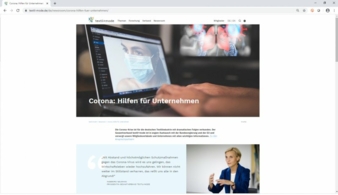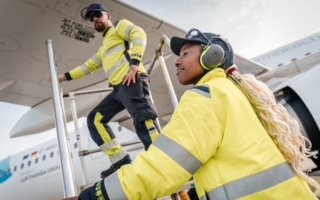19/06/2020 – Europe, the Textile Continent – Opportunities and Risks, Part 3 — auf Deutsch lesen
Covid-19 plunges Europe’s textile industry into deep crisis!
The face mask has become a something of a symbol for the coronavirus pandemic – not just in doctor’s surgeries or hospitals.
In fact, in many countries around the world, covering the face with a mask is now mandatory in the workplace, on public transport and for anyone going to the shops. And where it is not obligatory, many are wearing them of their own volition to prevent the further spread of Covid-19.
From Italian luxury labels to Swabian lingerie manufacturers
Companies everywhere have been switching their production to masks, doing their bit in the fight against the pandemic. Industrial sewing machines are humming, and new models of “community masks” – non-medical mouth and nose masks – are appearing every day. Companies in Europe are similarly being asked to make medical PPE as demand continues to soar.
This is a crisis in which the networking abilities of Germany’s industry associations are really being tested. Manufacturers of nonwovens are desperately looking for sewing capacities, while government ministries, clinics, care homes and clinicians are calling the associations for help in their urgent search for the protective materials and masks that have been in such short supply since the global pandemic began. Doctors and hospitals are sounding the alarm, warning they will not be able to treat any more patients if new PPE does not arrive soon. Entire government departments are scouring the world market and laying their hands on anything they can get. Unfortunately, given the extent of the coronavirus pandemic, the market has already been plundered with little remaining on the shelves. China, until now the world’s biggest supplier of medical masks, is struggling to keep up with demand. The world is facing a severe mask shortage, the like of which has never been seen before.
Companies who were yesterday producing mattresses suddenly started investing in the production of PPE. The online portals of industry networks such as the German textile industry associations Südwesttextil and Verband der Nordwestdeutschen Textil- und Bekleidungsindustrie, and fashion association German Fashion, but also in Brussels and Berlin, have been inundated with urgent requests from producers, suppliers and customers, desperately looking for masks. If not before, Europe’s textile industry has at last become crucial to the social and economic fabric of society.
Europe’s textile industry is crucial
Within a short space of time, completely new supply chains have sprung up with lingerie manufacturers suddenly collaborating with automotive suppliers to deliver PPE and masks to medical institutions. Shirt manufacturers are churning out hundreds of thousands of masks for big corporations, SMEs and the retail trade – all at breakneck speed!
However, for many companies, mask production is no more than a drop in the ocean.
Uwe Mazura, Managing Director of the Confederation of the German Textile and Fashion Industry (textil+mode):
“It’s impressive to see how our companies have stepped up to fill the gap in demand for masks, but this new line of business will fall a long way short of replacing their previous business volumes. Many of our SMEs are fully committed to helping in the fight against coronavirus, but in spite of everything, their efforts will not curb the full impact of the crisis and all the dramatic consequences that come with it for our industry.”
The European umbrella association EURATEX fears that the pandemic will slash sales and output by half, with 80 percent of companies expecting a wave of redundancies. In a survey conducted by textile+mode, around 80 percent of companies said they had applied for short-time working benefits, with a fifth stating they did not know how they would survive the next few weeks.
In Spain and Italy, everything has been at a standstill for weeks. France has seen a gradual return to public life since the beginning of May and in Germany too, the re-opening of shops shows that the falling rate of infection is allowing normal life to resume, albeit with a list of measures to prevent a resurgence.
Despite business protection programmes and loan schemes worth millions of euros, the President of textil+mode, Ingeborg Neumann, is sounding the alarm: “We need the borders across Europe to reopen and we need to reboot our economy with protective measures. The gridlock has to be overcome, otherwise the pandemic will pull our economies down with it which will have disastrous consequences for the 500 million people in the EU, who fear for their jobs and their prosperity.”
Re-start programme
In its re-start programme, textil+mode outlines possible ways in which a wave of insolvencies in the textile industry could still be averted. Consumer vouchers, longer opening hours and reducing VAT on textiles and footwear are just some ideas for kick-starting the economy. After all, one thing is certain: It will be some time before companies involved in the production of clothing and fashion or who supply to the automotive and aerospace industries bounce back from this crisis.
Also affected are firms that supply laundry to the hospitality industry or who equip hotel and cruise ships with linen, mattresses, and carpets. There is hardly anyone who will not have been adversely affected by this crisis in some way. In the lockdown month of April, Germany’s bricks-and-mortar fashion retailers saw sales plummet by 76 percent against the same period the year before. And even online stores are reporting that consumers are hesitant to buy fashion and clothing. A slide of nine percent in online clothing and eleven percent in online footwear sales in March and April are a serious cause for concern not only for trading companies but also for manufacturers.
Will coronavirus undo everything the SME-led textile industry in Europe and Germany has worked so hard to build in recent decades?
The hope is that the decision by Germany’s textile and fashion industry to invest time and energy in innovative and sustainable products and processes will finally pay off. “If we’re talking about sustainability and a Green Deal for Europe, we have plenty of solutions up our sleeves,” says Ingeborg Neumann who is calling for the EU Commission President von der Leyen and the German Government to see the innovative strength of Europe’s own industry as much more of an opportunity than it has done in the past.
“Competing for higher reductions won’t get us anywhere given the dimension of the economic crisis we’re facing. What we need right now are innovations.” In Ingeborg Neumann’s view, who herself owns companies in three different countries, the innovative strength of Europe’s textile industry has shone through quite impressively in recent weeks. By the end of April, German textile producers were making around 22 million masks per week – and rising! “This shows how well we can perform even when faced with an emergency and once we’ve overcome the worst of the pandemic, we will roll up our sleeves together and get on with the challenges ahead, provided of course the government gives us a helping hand and we survive the coming weeks.”





